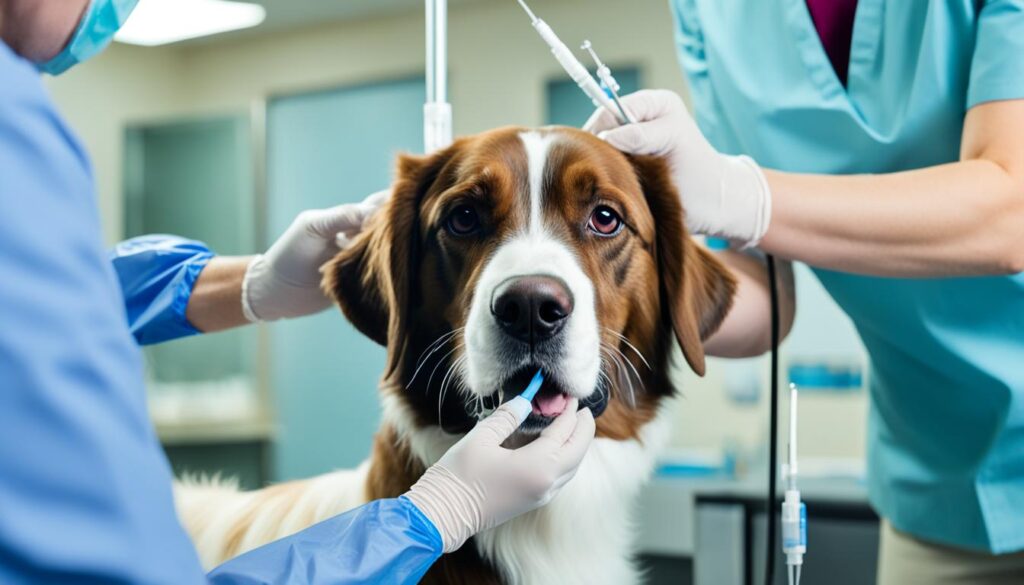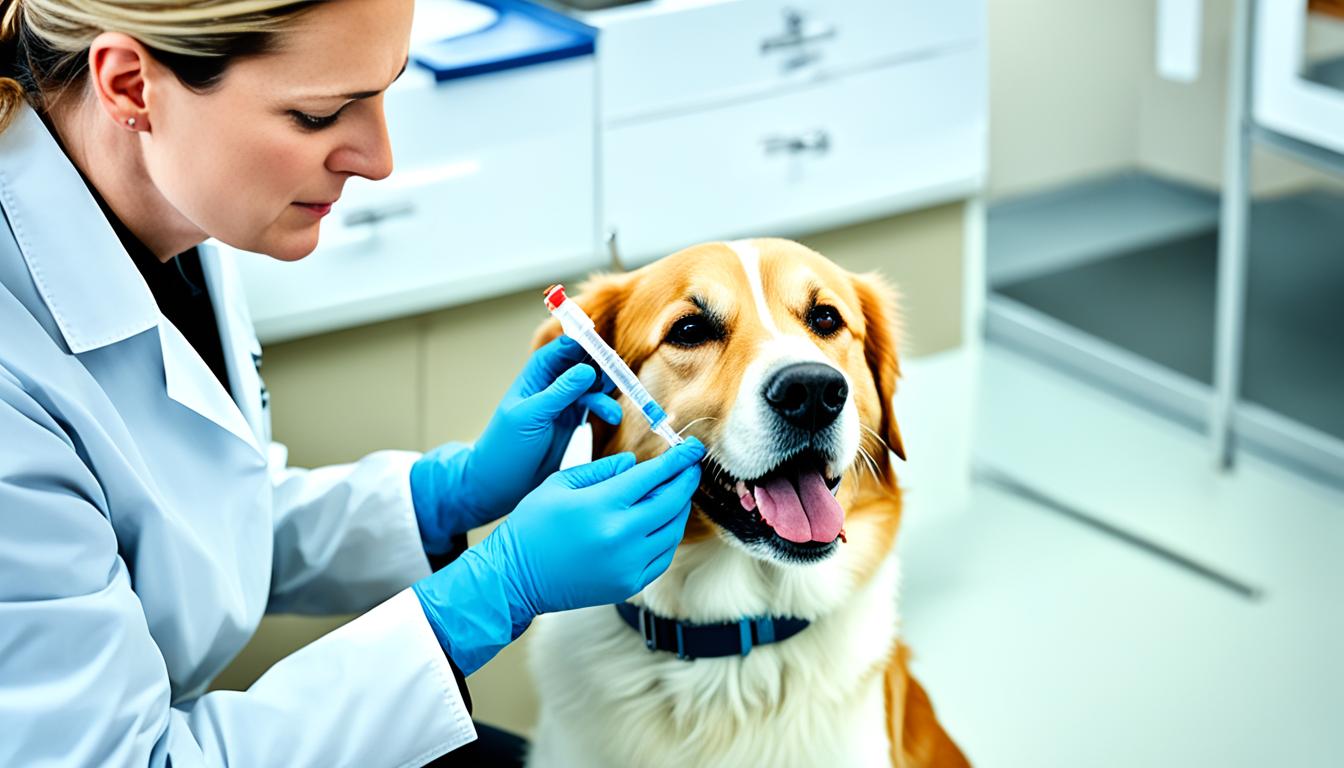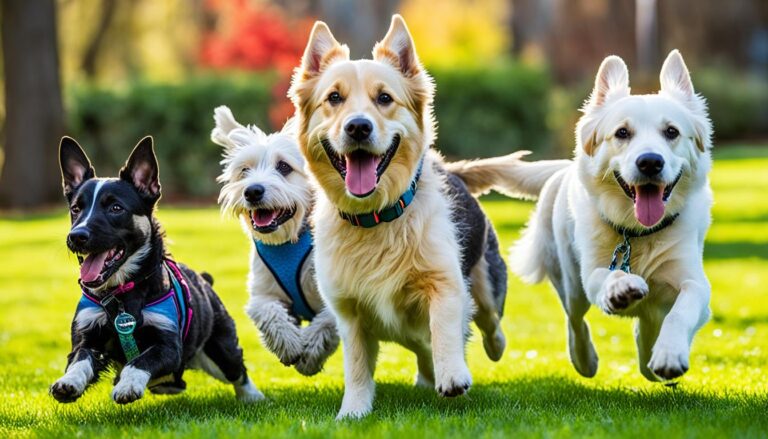how dog vaccines work
Ever wondered how a shot can keep your furry friend safe from serious diseases? Dog vaccines mix science and care to keep our pets healthy and happy. Let’s explore how these shots protect our dogs from getting sick.
Dog vaccines are key to keeping our pets safe from many diseases. They help the immune system fight off specific germs. All dogs need shots for parvo, distemper, and rabies. Some dogs might need more shots based on their lifestyle and risks.
The process of giving dogs vaccines is amazing. It uses killed or changed germs to prepare the immune system. This way, dogs can fight off diseases better. Thanks to this, many once deadly diseases are now much less common.
Now, we have safer and more effective vaccines thanks to new science. We can give each dog the right shots based on their age, health, and where they live. This means dogs get the right protection without getting too many shots1. Puppies need shots often until they’re about four months old. Adults dogs may only need shots every few years.
Key Takeaways
- Dog vaccines help the immune system fight certain diseases
- All dogs need core vaccines, with extra shots based on their lifestyle
- New vaccines are safer and work better thanks to science
- Shots are given based on what each dog needs
- Regular shots keep dogs immune for a long time
Understanding the Basics of Canine Vaccination
Canine vaccination is key to keeping our furry friends safe from many diseases. Let’s look at how vaccines work and help boost the dog’s immune system.
What is a vaccine?
A vaccine is a special medicine that helps the immune system fight certain germs. For dogs, vaccines have tiny pieces of germs that can’t make them sick. This helps the dog’s body learn to fight off real germs later.
The role of vaccines in boosting dog immunity
Vaccines are important for making a dog’s immune system stronger. They introduce tiny pieces of germs that don’t make dogs sick. This helps the immune system make antibodies to protect against future sickness. The first vaccine dose gets the immune system ready, and more doses make it even stronger2.
Core vs. non-core vaccines for dogs
There are two kinds of vaccines for dogs: core and non-core. All dogs need core vaccines, like for distemper and rabies3. Non-core vaccines depend on the dog’s risk level and might cover kennel cough or Lyme disease3.
| Vaccine Type | Diseases Covered | Recommended For |
|---|---|---|
| Core | Distemper, Adenovirus-2, Parvovirus, Rabies | All dogs |
| Non-core | Kennel Cough, Lyme Disease, Canine Influenza | Dogs with specific risk factors |
Knowing about canine vaccination helps us make good choices for our dogs. By following a vaccination plan and talking to a vet, we can keep our dogs safe from many diseases.
The Science Behind How Dog Vaccines Work
Vaccine science for dogs is key to keeping our furry friends safe. Let’s look into how these vaccines protect our dogs.
Stimulating the immune system response
Dog vaccines put weakened or inactive germs into the body. This makes the immune system make antibodies. These antibodies help fight off future sickness. It takes 10-14 days for this protection to start working, so puppies need several doses.
Types of vaccines: Modified live vs. killed
There are two main kinds of vaccines for dogs:
- Modified live vaccines: These have weakened germs that can copy themselves. They act like a mild infection but don’t make the dog sick.
- Killed vaccines: These use dead germs. They don’t copy themselves and are safer.
Both kinds help the immune system, but modified live vaccines give a stronger, longer defense.

Antibody production and long-term protection
After getting a vaccine, a dog’s immune system makes special antibodies. These antibodies stay in the blood, ready to fight off future germs. Important vaccines like those for distemper, adenovirus-2, parvovirus, and rabies protect against serious diseases4.
Puppies have antibodies from their mom that can block early vaccines. That’s why puppies get several doses of key vaccines from 6 to 16 weeks old4. This helps their immune system get ready for protection.
Knowing how dog vaccines work shows why we must follow vaccination schedules. By doing so, we keep our dogs safe from harmful diseases.
Vaccination Schedule and Administration for Dogs
Keeping your pet healthy means following a good vaccination schedule. We’ll show you how to vaccinate puppies and adult dogs. It’s important to know when to give shots for your pet’s health.

Puppies start getting shots between 6-8 weeks old. They first get shots for distemper and parvovirus5. Then, at 10-12 weeks, they get the DHPP vaccine against distemper, adenovirus, parainfluenza, and parvovirus5.
At 16-18 weeks, puppies get more shots, including DHPP and rabies5.
Adult dogs need booster shots every 1-3 years5. Some shots, like DHPP and rabies, last three years6. Others might need shots every year.
How you give vaccines matters. Most are injected under the skin or into muscle. Some, like kennel cough vaccine, go into the nose. Shots for puppies cost $75 to $100, with rabies shots $15 to $205.
Your vet will make a vaccine plan for your dog. They’ll think about your dog’s life and local health risks. Going to regular vet check-ups and following the shot plan keeps your dog healthy.
How Dog Vaccines Work to Prevent Common Canine Diseases
Canine vaccination is key to keeping our furry friends safe from many health issues. We’ll look into how vaccines protect dogs from common diseases.
Protection against rabies
Rabies vaccines are a must in most states because the disease can spread to humans and is deadly. Dogs need two rabies shots a year apart, then boosters every three years for ongoing safety78. This careful vaccination plan has helped wipe out local dog rabies in many places8.
Combating distemper and parvovirus
Distemper and parvovirus are very contagious and can be deadly. Puppies and dogs without vaccines are most at risk for parvovirus, which can stay in the air long after an infected dog leaves98. Distemper spreads through discharges and can cause serious symptoms, so vaccines are key to stopping it9.
Guarding against kennel cough and canine influenza
Kennel cough is very contagious and can turn into pneumonia. The Bordetella vaccine protects against kennel cough and is needed every six months for dogs in kennels or daycare79. Canine influenza is another respiratory disease that vaccines can prevent, especially for dogs that meet other dogs.
Vaccines greatly lower the risk and severity of infections, but they can’t always prevent all diseases. Keeping your dog healthy with good food and cleanliness can also lower infection risks9. The HPHF coalition says it’s important to talk to a vet to find out what vaccines and how often your dog needs them8.
| Disease | Vaccination Schedule | Key Points |
|---|---|---|
| Rabies | 2 initial vaccines a year apart, then every 3 years | Legally required, crucial for public health |
| Parvovirus | Every 3 weeks until 4 months old, then annually | Highly contagious, especially dangerous for puppies |
| Distemper | Every 3 weeks until 4 months old, then annually | Spreads through discharges, can be severe |
| Kennel Cough | Every 6 months for at-risk dogs | Important for social dogs, prevents respiratory issues |
The Importance of Booster Shots and Maintaining Immunity
Booster shots are key for dogs’ immune systems. They keep dogs safe from many diseases. How often dogs need these shots depends on the vaccine and their risk level. Some shots last for years, while others need a yearly shot10.
Not getting booster shots can be risky for dogs. Rules from government groups make sure vaccines are safe and work well10. Dogs with low-risk lives might only need core vaccines every three years10.
Vaccines against viruses protect for at least three years. But vaccines against bacteria need a yearly shot10. Giving a vaccine too early or too late might not be right10.
Seeing the vet often is key. It helps find infections and diseases in dogs. Dogs age faster than people, so these visits are more important10. At these visits, your vet can check your dog’s health and update their shots based on their life, age, and health10.
Antibody tests can check how well dogs are immune. But they cost more than getting shots again10. These tests don’t replace shots but help know your dog’s immune level. Keeping up with booster shots and vet visits keeps dogs safe all their lives.
Potential Side Effects and Safety Considerations of Dog Vaccines
It’s key to know about pet immunology when thinking about dog vaccines. Most vaccines are safe and work well. But, it’s good to know about possible side effects. A study in 2005 looked at over 1 million dogs. It found about 1 in 260 dogs had a vaccine reaction, no matter how bad11.
Some dogs are more likely to have bad reactions. Young dogs, small breeds, and Boxers are at higher risk11. The most at-risk breeds are Dachshunds, Pugs, Boston Terriers, Miniature Pinschers, and Chihuahuas11. To lower risks, we suggest waiting at least two weeks between vaccines. This helps figure out which vaccine caused a reaction if one happens11.
Even though rare, serious side effects can happen. These include collapse, trouble breathing, severe coughing, hives, or swollen eyes12. If you see these signs, get vet help right away. As a safety step, stay at the clinic for 30 to 60 minutes after the vaccine if you worry about reactions12. Still, vaccines are key in stopping serious diseases and help millions of pets every year12.
FAQ
What is a vaccine?
What is the difference between core and non-core vaccines for dogs?
How do vaccines stimulate the immune system response in dogs?
What is the typical vaccination schedule for puppies and adult dogs?
What diseases do common dog vaccines protect against?
Why are booster shots important for maintaining immunity in dogs?
Are there any potential side effects or safety concerns with dog vaccines?
Source Links
- https://www.4pawsanimal.com/services/dogs/dog-vaccinations – Dog Vaccinations
- https://www.avma.org/resources-tools/pet-owners/petcare/vaccinations – Vaccinations
- https://vcahospitals.com/know-your-pet/vaccines-for-dogs – Vaccines for Dogs | VCA Animal Hospitals
- https://www.ncbi.nlm.nih.gov/pmc/articles/PMC7348620/ – Canine vaccines
- https://www.akc.org/expert-advice/health/puppy-shots-complete-guide/ – No title found
- https://www.abornpethospital.com/services/dogs/dog-vaccinations – Dog Vaccinations
- https://www.clarkroadanimalclinic.com/services/dogs/dog-vaccinations – Dog Vaccinations – Puppies and Adult Dogs – What, Why, When and More
- http://publichealth.lacounty.gov/vet/HPHF/HPHF_Vx.htm – Healthy Pets Healthy Families – Vaccine-Preventable Disease
- https://southcranbournevet.com.au/preventative-care/preventing-dog-diseases-with-vaccinations/ – Preventing Dog Diseases With Vaccinations – South Cranbourne Veterinary Surgery
- https://vcahospitals.com/know-your-pet/vaccination-are-booster-vaccines-necessary-for-dogs – Are Booster Vaccines Necessary for Dogs? | VCA Animal Hospitals
- https://www.petmd.com/dog/general-health/possible-vaccine-reactions-in-dogs – What To Know About Possible Vaccine Reactions in Dogs
- https://vcahospitals.com/know-your-pet/care-for-your-pet-after-vaccination – Care for Your Pet After Vaccination | VCA Animal Hospitals





